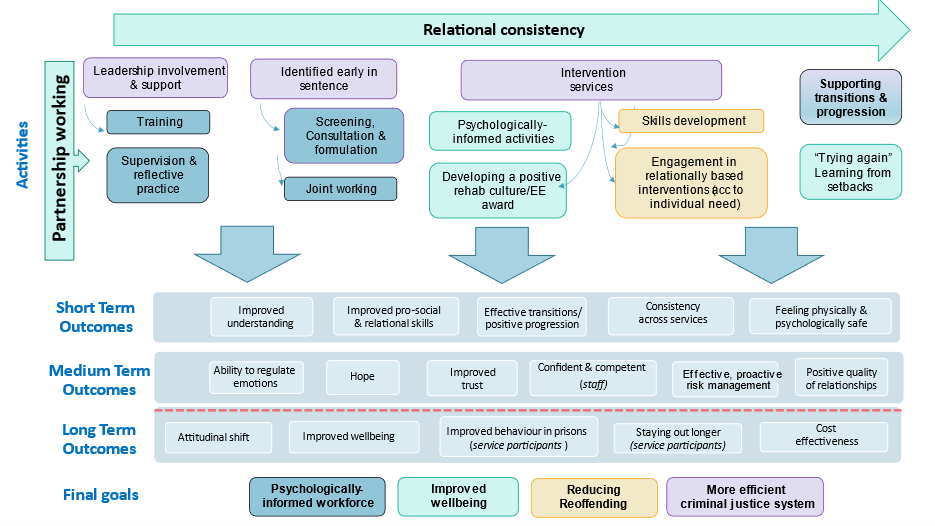Introduction to the Offender Personality Disorder (OPD) Pathway
The Offender Personality Disorder (OPD) Pathway is a set of psychologically-informed services operating across criminal justice and health, underpinned by a set of principles and quality standards. It aims to reduce risk associated with serious re-offending and improve mental health within a high-risk, high-harm cohort likely to meet the clinical threshold for a diagnosis of ‘personality disorder’, using evidence-based therapeutic relational approaches and enabling environments. The OPD Pathway is a jointly funded partnership between His Majesty’s Prison and Probation Service (HMPPS) and NHS England. It is a long-term change programme that commissions treatment and support services nationally for people with ‘personality disorder’, whose complex mental health problems are linked to their harmful offending. The OPD Pathway has been set up as a ‘demonstrator’ initiative; it aims to pilot and evaluate new approaches to interventions for this highly complex group. Services for people in scope are provided in prisons, adult secure mental health services and in the community. The OPD Pathway provides the framework which underpins the commissioning of these services and enables health and criminal justice agencies to work together as a single service offer. It also provides specialist training and support for staff. The OPD Pathway is not one single entity, but a series of connected interventions and activities. All services work towards the overarching OPD Pathway aims and principles by providing different functions to support people through their sentence and according to their intervention and management needs.
LPP are the largest NHS provider of OPD services nationally.
A joint vision
Both host agencies, the NHS and HMPPS, share these overarching aims:
- A reduction in repeat, high-harm offending.
- Improved psychological health, wellbeing, pro-social behaviour and relational outcomes.
- Improved competence, confidence and wellbeing of staff working with people in the criminal justice system showing personality difficulties.
- Increased efficiency, cost-effectiveness and quality of OPD pathway services.
Neither agency can address these aims alone: success can only be achieved through a joint, integrated approach at all levels. This strategy restates the shared commitment to these four overarching aims and to a joint approach to achieving them. Shared responsibility for the most complex people in the criminal justice system remains the core principle that underpins the pathway.
The joint aspiration is to have a more therapeutically-minded and compassionate prison and probation service that will deliver the pathway’s aims by making therapeutic use of the relationships between people. This will involve psychologically-informed practice embedded across HMPPS, and a prison system that understands and creates enabling environments that deliver opportunities for people to tackle their offending and improve their mental health. These ‘relational environments’ are at the heart of the pathway and deliver evidence-based, psychologically-informed practice, where staff are empowered by a reflective practice culture.
Achievements over the first ten years
- The OPD pathway has demonstrated that a joint programme between agencies and departments can be delivered.
- The concept has been established that there is a functional link between complex mental health and offending and that the two agencies can effectively work together to address it.
- A growing network of connected, innovative services has been established, underpinned by evidence-based quality standards and principles that meet people’s needs, while recognising that one size does not fit all.
- Psychologically informed consultancy has been embedded across probation, and is available to all probation practitioners.
- The number of treatment places in prisons has increased, with an intervention and risk management service rolled out across probation.
- A new model for a psychologically informed planned environment has been piloted and developed, which supports people to access the next stage of their pathway both in prisons and in the community.
- Evaluation has been embedded into the pathway across existing and new initiatives and through a robust quality standards framework.
The OPD Pathway Model of Change

Aims for the next 5 years
The next steps are to consolidate and build on the work so far. Following a system-wide strategic review of the pathway, the following eight ambitions have been identified to support this. They sit within two types of considerations: pathway and system, in accordance with the pathway’s dual emphasis on both service development and system influence and improvement. Each ambition has a set of related objectives for 2023 to 2028:
Pathway-level ambitions
- Responding to unmet complexity of need.
- Pathway consistency and quality.
- Promoting diversity and inclusion.
- Enhancing identification, pathway planning, referrals and access.
- Strengthening transitional support.
System-level ambitions
- Supporting a whole system response to complexity, risk and need.
- Prioritising a relational practice culture.
- Building the evidence base.
Over the next 5 years, working toward these ambitions will:
- Build the evidence base, by designing high-quality evaluations that are guided by the OPD pathway’s theory of change, and cascade learning more widely about using psychologically-informed, relational approaches to working with complexity.
- Create consistency in delivery, by filling gaps in service provision and in pathway planning, to realise the vision of a complete pathway from community to community.
- Achieve consistency in quality, by developing data capacity, producing centralised guidance to support delivery and streamlining the workforce development offer.
